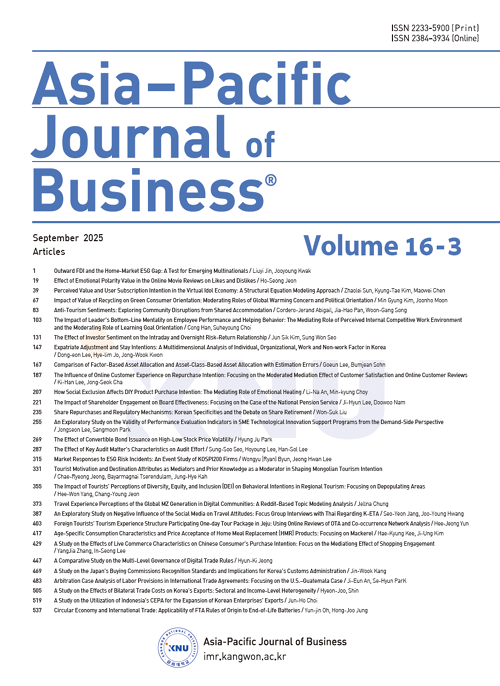- 영문명
- Circular Economy and International Trade: Applicability of FTA Rules of Origin to End-of-Life Batteries
- 발행기관
- 강원대학교 경영경제연구소
- 저자명
- 오윤진(Yun-jin Oh) 정홍주(Hong-Joo Jung)
- 간행물 정보
- 『아태비즈니스연구』제16권 제3호, 537~553쪽, 전체 17쪽
- 주제분류
- 인문학 > 문학
- 파일형태
- 발행일자
- 2025.09.30
4,840원
구매일시로부터 72시간 이내에 다운로드 가능합니다.
이 학술논문 정보는 (주)교보문고와 각 발행기관 사이에 저작물 이용 계약이 체결된 것으로, 교보문고를 통해 제공되고 있습니다.

국문 초록
Purpose - The purpose of this study is to examine the applicability of Free Trade Agreement (FTA) rules of origin to end-of-life (EOL) batteries within the framework of the circular economy. In particular, this study aims to analyze how recycling, reuse, and remanufacturing of EOL batteries are treated under preferential trade agreements, and to identify limitations and policy implications for Korea and other economies pursuing sustainable trade strategies.
Design/methodology/approach - This study adopts a qualitative and legal-institutional analysis based on FTA texts, HS classification rules, and policy documents. Comparative analysis is conducted across major FTAs (e.g., Korea-US FTA, Korea-EU FTA, Korea-Canada FTA, RCEP) to examine the treatment of waste, scrap, and remanufactured goods. In addition, policy reviews of Korean legislation such as the Framework Act on Carbon Neutrality and Green Growth (2022), the Act on Transition to a Circular Economy (2024), and the proposed Act on Fostering the End-of-Life Battery Industry (2025) are incorporated to contextualize domestic strategies.
Findings - The analysis reveals three key findings. First, EOL batteries recycled for material recovery are generally recognized as “wholly obtained goods” under most FTA provisions, thereby eligible for preferential treatment regardless of the origin of input materials. Second, reused or remanufactured batteries retain their original function and HS classification, and thus rarely meet the wholly obtained criterion or the product-specific rules of origin (PSR), creating structural limitations in FTA utilization. Third, some agreements (e.g., Korea-US FTA, Korea-Canada FTA) introduce exceptions for remanufactured goods, but the scope remains narrow and fragmented across agreements. Overall, the current rules of origin reflect a linear economic paradigm and fail to fully accommodate the characteristics of circular economy products.
Research implications or originality - This study contributes to the emerging literature on the intersection of the circular economy and international trade by highlighting how FTA rules of origin interact with recycling, reuse, and remanufacturing practices. The findings underscore the need for revising origin criteria to better reflect circular economy realities, such as explicit definitions of remanufactured goods and expanded recognition of reused products. For Korea, strengthening institutional support for the EOL battery industry and aligning FTA rules with circular economy objectives are crucial for enhancing trade competitiveness and achieving sustainable growth.
영문 초록
목차
Ⅰ. 서론
Ⅱ. 이론적 배경
Ⅲ. 순환경제로의 전환과 우리나라 추진 동향
Ⅳ. 사용후 배터리와 FTA 활용
Ⅴ. 결론
References
키워드
해당간행물 수록 논문
- Perceived Value and User Subscription Intention in the Virtual Idol Economy: A Structural Equation Modeling Approach
- Impact of Value of Recycling on Green Consumer Orientation: Moderating Roles of Global Warming Concern and Political Orientation
- Anti-Tourism Sentiments: Exploring Community Disruptions from Shared Accommodation
- 리더의 성과주의 사고방식이 직원의 직무성과 및 도움 행동에 미치는 영향: 지각된 내부 경쟁 분위기의 매개효과 및 학습목표 지향성의 조절효과
- 투자자 심리가 주간과 야간의 위험-수익률 관계에 미치는 영향
- Outward FDI and the Home-Market ESG Gap: A Test for Emerging Multinationals
- Effect of Emotional Polarity Value in the Online Movie Reviews on Likes and Dislikes
- 해외파견자의 적응과 체류의도: 개인, 조직, 업무, 비업무 요인의 다차원적 영향에 대한 한국 사례 연구
- 추정오차를 감안한 팩터 기반 최적 조합과 자산 기반 최적 조합 우위 비교
- 온라인 고객경험이 재구매의도에 미치는 영향: 고객만족과 온라인 소비자 리뷰의 조절된 매개효과를 중심으로
- 사회적 배제가 DIY 제품 구매의도에 미치는 영향: 정서적 치유의 매개효과
- 기관투자자의 주주활동이 이사회 효과성에 미치는 영향: 국민연금공단 사례를 중심으로
- 자사주의 활용과 규제 메커니즘 비교: 한국의 특수성과 자사주 소각 논의
- 중소기업 기술혁신 지원사업의 성과평가지표에 대한 수요자 관점의 탐색적 연구
- 전환사채 발행 비중이 일별 주가 변동성에 미치는 영향
- 핵심감사사항의 특성이 감사노력에 미치는 영향
- 부정적 ESG 이슈와 기업가치: KOSPI200 이벤트 스터디 분석
- 관광 동기와 선택속성의 매개 및 사전지식의 조절 효과가 몽골 관광 의도에 미치는 영향 연구
- 관광객의 DEI 인식이 지역관광 행동의도에 미치는 영향: 인구소멸 지역을 중심으로
- 디지털 커뮤니티 내 글로벌 MZ세대의 여행 경험 인식: Reddit 기반 토픽모델링 분석
- 셜미디어 이용이 여행태도에 미치는 부정적 영향에 대한 탐색적 연구: 태국인의 K-ETA 관련 포커스그룹 인터뷰를 중심으로
- 외국인 관광객의 제주 당일 여행상품 관광경험구조: OTA의 온라인 리뷰와 Co-occurrence 네트워크 분석을 활용하여
- 가정간편식(HMR) 제품의 연령별 소비 특성과 가격 수용성 분석: 고등어를 중심으로
- 라이브 커머스 특성이 중국 소비자의 구매의도에 미치는 영향에 관한 연구: 쇼핑 몰입의 매개 효과를 중심으로
- 디지털 무역 규범의 다층 거버넌스 비교연구
- 일본의 구매수수료 인정 기준과 우리나라 관세행정에 대한 시사점
- 국제통상협정 노동조항의 중재사례 분석: 미·과테말라 중재사례 중심으로
- 한국의 양자 무역비용이 수출에 미치는 영향: 산업별‧소득수준별 이질효과
- 우리 기업 수출확대를 위한 인도네시아 CEPA 활용 방안에 관한 연구
- 순환경제와 국제무역: 사용후 배터리를 중심으로 FTA 원산지 규정 적용 가능성에 대한 고찰
참고문헌
- Journal of Cleaner Production
- Journal of Industrial Ecology
- Official Journal of the European Union
- Journal of Cleaner Production
- Journal of Cleaner Production
- Nature
- Futures
- Resources, Conservation and Recycling
- Journal of Cleaner Production
- Nature Communications
- Resources, Conservation and Recycling
- Nature Communications
- Journal of Industrial Ecology
- KIEP Policy Briefing
- OECD Publishing
- UNEP
- WEF
- Journal of Cleaner Production
- Resources, Conservation and Recycling
관련논문
인문학 > 문학분야 BEST
더보기인문학 > 문학분야 NEW
- Perceived Value and User Subscription Intention in the Virtual Idol Economy: A Structural Equation Modeling Approach
- Impact of Value of Recycling on Green Consumer Orientation: Moderating Roles of Global Warming Concern and Political Orientation
- Anti-Tourism Sentiments: Exploring Community Disruptions from Shared Accommodation
최근 이용한 논문
교보eBook 첫 방문을 환영 합니다!

신규가입 혜택 지급이 완료 되었습니다.
바로 사용 가능한 교보e캐시 1,000원 (유효기간 7일)
지금 바로 교보eBook의 다양한 콘텐츠를 이용해 보세요!



